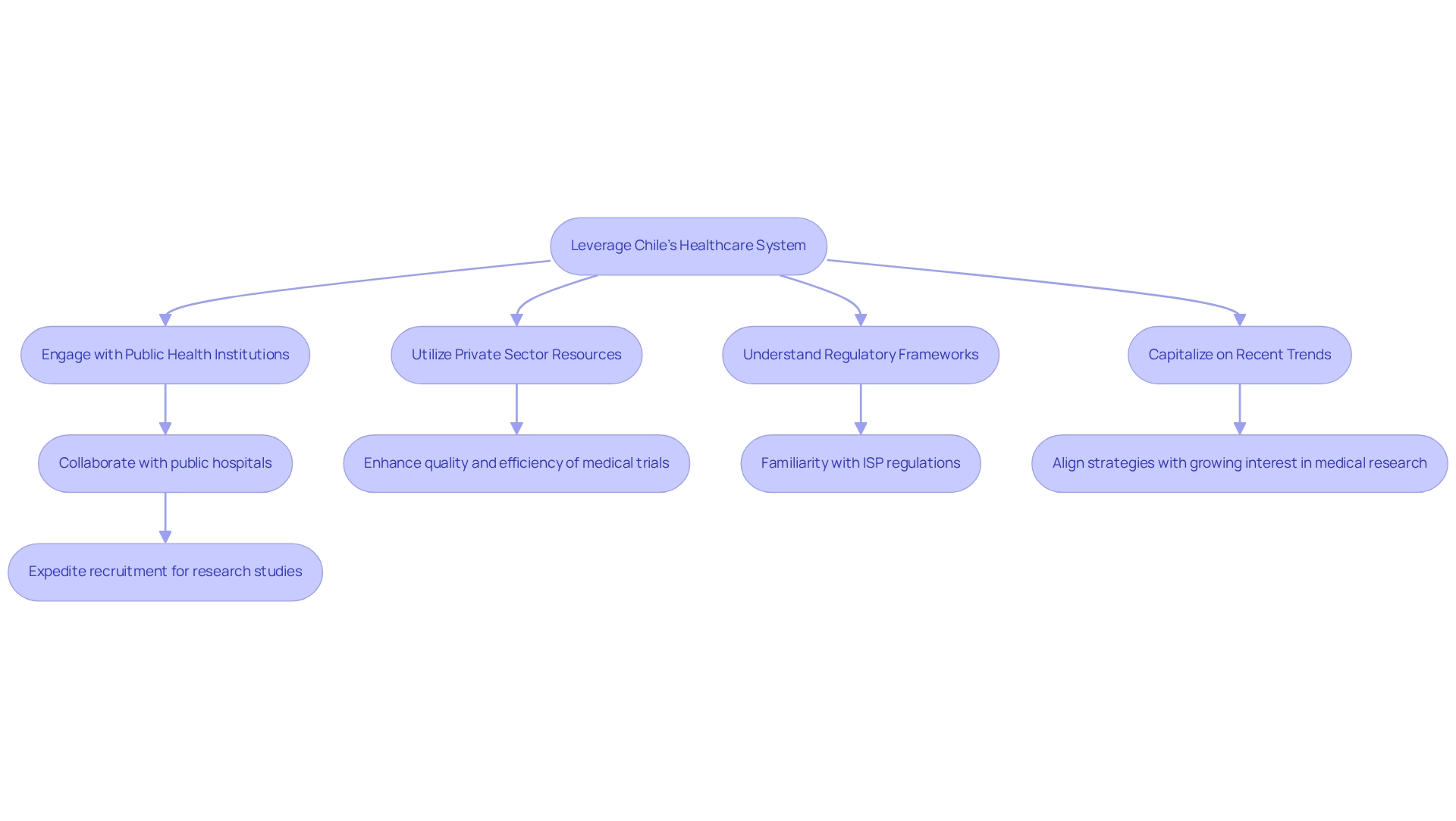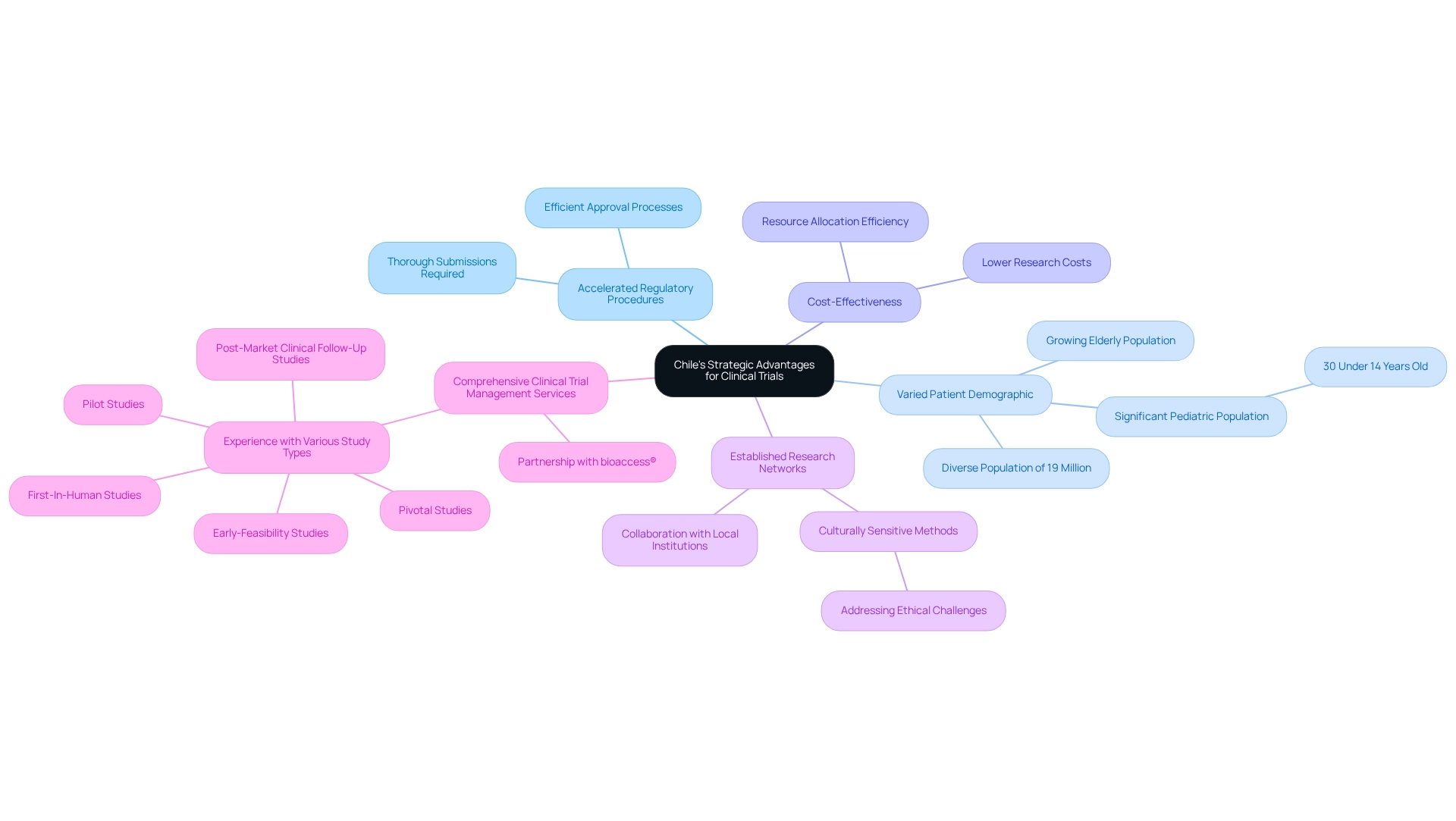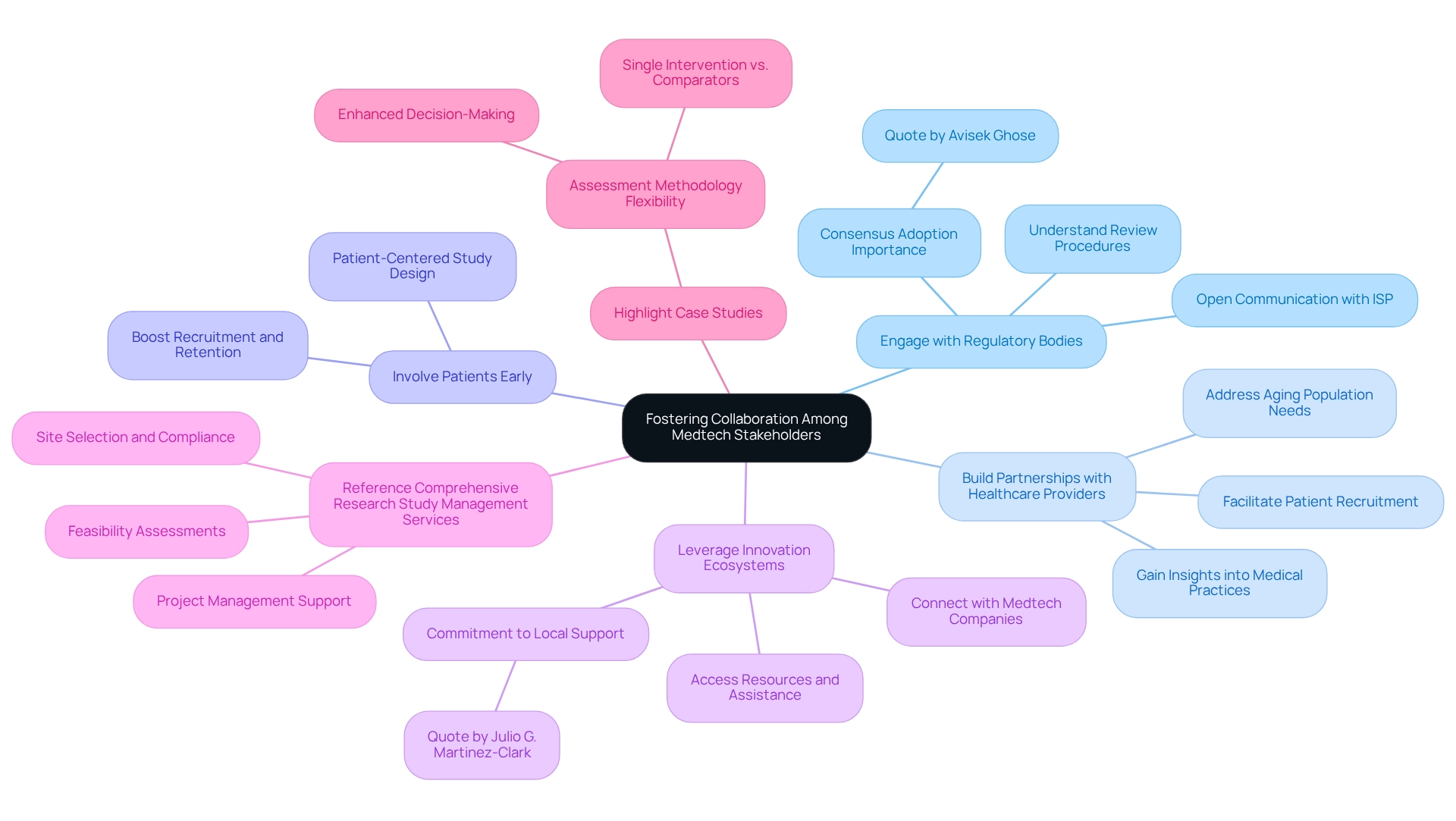Overview
Maximizing medtech innovation through Chilean research strategies is crucial for advancing clinical research. This involves leveraging the country's dual healthcare system, engaging with public health institutions, and understanding regulatory frameworks to enhance clinical trials and research outcomes. Specific strategies, such as collaborating with local healthcare providers and utilizing diverse patient demographics, can significantly accelerate research processes. By doing so, we can improve the quality of medical technology advancements in Chile, ultimately addressing key challenges in the medtech landscape.
Introduction
In the dynamic landscape of Medtech, Chile's unique healthcare system presents both opportunities and challenges for innovation. With its dual model of public and private healthcare, companies can tap into a diverse patient demographic and a range of facilities that facilitate clinical trials. However, the inherent inefficiencies and inequalities within the system necessitate strategic approaches for success.
By engaging with public health institutions, leveraging private sector resources, and understanding the regulatory environment, Medtech companies can position themselves to thrive in this evolving market.
As interest in clinical research surges, the potential for collaboration and growth in Chile's Medtech sector becomes increasingly promising, paving the way for advancements that not only enhance medical technology but also contribute to the local economy.
Leverage Chile's Healthcare System for Medtech Innovation
Chile's healthcare system operates on a dual model, integrating both public and private sectors, which grants medical technology companies access to a diverse array of patient populations and healthcare facilities. However, this system is marked by inefficiency and pronounced inequality based on risk and income, posing significant challenges for innovation. To effectively harness this structure for Medtech advancement, companies should consider several strategies:
- Engage with Public Health Institutions: Collaborating with public hospitals, known for their high patient turnover and diverse demographics, can greatly expedite recruitment for research studies.
- Utilize Private Sector Resources: The advanced technologies and specialized services available in private healthcare institutions can enhance the quality and efficiency of medical trials.
- Understand Regulatory Frameworks: Familiarity with the regulations set forth by the Instituto de Salud Pública (ISP) is essential, as compliance is crucial for securing study approvals and ensuring successful outcomes.
- Capitalize on Recent Trends: A notable 25% increase in study registrations in 2025 compared to the previous year underscores a growing interest in medical research in Chile. Companies should align their strategies to leverage this momentum and foster innovation within the medical technology sector.
In this context, partnering with bioaccess® can provide invaluable support. With over 20 years of expertise in medical technology, bioaccess specializes in overseeing a range of research studies, including Early-Feasibility Studies (EFS), First-In-Human Studies (FIH), Pilot Studies, Pivotal Studies, and Post-Market Follow-Up Studies (PMCF). Their extensive knowledge ensures that medical technology firms can navigate the complexities of trial processes efficiently, thereby enhancing the likelihood of favorable results.
Furthermore, medical studies not only propel healthcare technology forward but also bolster local economies through job creation and improved healthcare services. As Vivienne C. Bachelet notes, "Our analysis and underlying assumptions, which in turn establish some limitations, allow us to provide recommendations for the current reform process in Chile." This statement emphasizes the significance of understanding the ongoing reforms within the healthcare system, particularly the shift from mandatory to complementary insurance, which seeks to improve equity and access to healthcare while ensuring rigorous government regulation of private insurance markets. By adeptly navigating these complexities with the support of bioaccess, Medtech companies can position themselves for success in Chile's dynamic healthcare landscape.

Utilize Chile's Strategic Advantages for Clinical Trials
Chile presents numerous strategic advantages for conducting medical studies.
Accelerated Regulatory Procedures: The Instituto de Salud Pública (ISP) has established efficient processes for research study approvals, significantly reducing the time from application to initiation. To capitalize on this efficiency, companies must ensure their submissions are thorough and well-prepared. This fast-tracking is essential in meeting the increasing demand for timely R&D investment, particularly in Medtech innovation through Chilean research, as evidenced in other regions where companies are mandated to reinvest at least 10% of their sales into R&D activities.
Varied Patient Demographic: With a population exceeding 19 million, Chile boasts a diverse demographic that is vital for enhancing the generalizability of research findings. Engaging specific populations can yield results that are more relevant and applicable across various demographics. As noted by Karen Politis Virk, the substantial pediatric population—30% of the population is reportedly under 14 years old—indicates a growing elderly patient demographic, potentially expanding the market for new drugs.
Cost-Effectiveness: Companies can achieve Medtech innovation through Chilean research at a frequently lower cost than in other regions, enabling them to allocate resources more efficiently. This cost advantage is especially beneficial for startups and smaller firms aiming to optimize their research budgets.
Established Research Networks: Collaborating with local research institutions and universities can provide invaluable resources and expertise, facilitating smoother project execution and efficient data collection. These partnerships can enhance the overall quality and reliability of medical research efforts in the region. Additionally, understanding local healthcare systems is crucial for successful study implementation, as it allows for culturally sensitive methods that respect patient rights and local traditions. This approach addresses ethical challenges that may arise in diverse patient groups, particularly in the sphere of Medtech innovation through Chilean research. Effectively managing linguistic and cultural differences can significantly improve the quality of research and healthcare in Latin America.
Comprehensive Clinical Trial Management Services: With over 20 years of experience, bioaccess® provides accelerated medical device clinical study services in Latin America, managing Early-Feasibility Studies (EFS), First-In-Human Studies (FIH), Pilot Studies, Pivotal Studies, and Post-Market Clinical Follow-Up Studies (PMCF). By partnering with bioaccess®, companies can adeptly navigate the complexities of the Latin American medical technology landscape, ensuring compliance and successful study outcomes.

Foster Collaboration Among Medtech Stakeholders
To foster collaboration among Medtech stakeholders in Chile, it is essential to consider the following strategies:
- Engage with Regulatory Bodies: Establish open lines of communication with the Instituto de Salud Pública (ISP) and other regulatory authorities to ensure alignment on expectations and requirements for research studies. Interacting with these organizations is essential, as their thorough review procedures can greatly influence the endorsement and success of research trials. As Avisek Ghose notes, "The reports undergo rigorous review by regional health authorities and stakeholders before consensus adoption," highlighting the importance of collaboration in navigating these processes.
- Build Partnerships with Healthcare Providers: Collaborating with hospitals and clinics is vital for facilitating patient recruitment and data collection. These partnerships not only enhance access to patient groups but also provide insights into medical practices and patient requirements, which are crucial for creating successful studies. Given that Chile's aging population is projected to reach 24.9 percent by 2050, addressing the needs of this demographic is increasingly urgent.
- Involve Patients Early: Engaging patients in the trial design process can lead to more relevant and patient-centered studies. This method has been demonstrated to boost recruitment and retention rates, ultimately improving the quality of data gathered.
- Leverage Innovation Ecosystems: Participation in local health innovation ecosystems, such as ECOS, is beneficial for connecting with other Medtech companies, researchers, and investors. These networks can offer valuable resources and assistance for navigating the research study landscape, fostering a collaborative environment that promotes Medtech innovation through Chilean research for all parties involved. Additionally, as noted by Julio G. Martinez-Clark, a letter stating the manufacturer's commitment to providing local post-sale technical support, including replacement parts, is required, emphasizing the need for strong partnerships.
- Reference Comprehensive Research Study Management Services: The expertise offered by bioaccess® in managing research studies includes feasibility assessments, site selection, compliance evaluations, study setup, import permits, project management, and reporting. This comprehensive approach can assist healthcare technology stakeholders in navigating the complexities of clinical trials more effectively.
- Highlight Case Studies: The flexibility demonstrated in AEMPS assessments, which typically involve a single intervention compared to one or more comparators, is noteworthy. This adaptability allows AEMPS to better inform stakeholders and enhance decision-making in therapeutic positioning, illustrating how regulatory bodies can support collaboration among Medtech stakeholders.

Conclusion
Chile's healthcare system offers a distinctive landscape for Medtech innovation, characterized by its dual public-private model that grants access to a diverse array of patient populations and healthcare facilities. By strategically engaging with public health institutions, leveraging private sector resources, and adeptly navigating the regulatory environment, Medtech companies can effectively harness these advantages. The rise in clinical study registrations underscores a growing interest in research, suggesting abundant opportunities for collaboration that can drive innovation and bolster local economies.
Furthermore, the strategic advantages of conducting clinical trials in Chile—such as expedited regulatory processes, a varied patient demographic, cost-effectiveness, and established research networks—position the country as an attractive hub for Medtech research. By fostering collaboration among stakeholders, including regulatory bodies, healthcare providers, and patients, companies can ensure their clinical trials are not only compliant but also relevant and impactful.
Ultimately, the potential for Medtech growth in Chile is substantial. By capitalizing on the country’s healthcare dynamics and nurturing strategic partnerships, companies can navigate the complexities of clinical trials more effectively, paving the way for advancements that benefit both the industry and the local population. Embracing these opportunities will not only enhance medical technology but also contribute to a more equitable healthcare system in Chile.
Frequently Asked Questions
What is the structure of Chile's healthcare system?
Chile's healthcare system operates on a dual model that integrates both public and private sectors, allowing medical technology companies access to a diverse range of patient populations and healthcare facilities.
What challenges does the Chilean healthcare system pose for innovation?
The system is marked by inefficiency and significant inequality based on risk and income, which poses challenges for innovation in the medical technology sector.
How can medical technology companies leverage public health institutions?
By collaborating with public hospitals that have high patient turnover and diverse demographics, companies can expedite recruitment for research studies.
What role does the private sector play in medical trials?
Private healthcare institutions offer advanced technologies and specialized services that can enhance the quality and efficiency of medical trials.
Why is it important to understand regulatory frameworks in Chile?
Familiarity with the regulations set by the Instituto de Salud Pública (ISP) is essential for compliance, securing study approvals, and ensuring successful outcomes in research.
What recent trend in medical research should companies capitalize on?
There has been a notable 25% increase in study registrations in 2025 compared to the previous year, indicating a growing interest in medical research in Chile.
How can partnering with bioaccess® benefit Medtech companies?
Bioaccess® has over 20 years of expertise in overseeing various research studies, helping Medtech firms navigate trial processes efficiently and enhancing the likelihood of favorable results.
What impact do medical studies have beyond healthcare technology?
Medical studies contribute to local economies by creating jobs and improving healthcare services.
What is the significance of ongoing reforms in Chile's healthcare system?
Understanding the reforms, particularly the shift from mandatory to complementary insurance, is crucial for improving equity and access to healthcare while ensuring rigorous regulation of private insurance markets.




